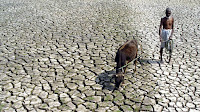Thanks to climate change, farmers are now contending with more unexpected weather than usual in recent years. Farmers have always been subject to the whims of nature, but eaters in the developed world haven’t had to worry too much about their problems. For every crop failure there was someone else with a bumper harvest. That may be about to change.
The Food and Agriculture Organization of the United Nations estimates demand for food will increase 60 percent by 2050 as the human population grows. And if climate change escalates as predicted, the task force said global food shortages could become three times more likely within a few decades.
Grain production is concentrated to a few crops in a few countries. Extreme weather events in two or more of those places would “create a multiple bread basket failure,” the report said.
...
People living in remote areas of poorer countries might be shielded from the effects of a global food panic, said Marshall Burke, an assistant professor at Stanford’s Center on Food Security and the Environment, in an email. But he continued: “That said, the best evidence we have suggests that the majority of the poor — even the rural poor — spend more on food than they earn from selling it. And so if even some of the assumed food prices spikes reach rural areas, these are likely to have a net negative impact on welfare for rural households.”
Wealthy countries rely on these food systems, too. After all, U.S. exports supply more than 30 percent of the world’s rice, corn, and wheat. And even developed countries are subject to spikes in food cost. “In rich countries, where food is freely available, food price inflation was significant and the poorest suffered,” the report said in a section discussing the weather’s impacts on grain yields in the past. The result? “People trading down on food quality or quantity, and in the process spending significantly more.”
Food researchers have long cautioned that climate change will impact food availability and system stability. Burke said rising temperatures have already put pressure on crop yields in most of the tropics and many parts of the developed world, and that there is evidence we’re going to see more weather-related social problems with future climate change. The recent three-year Syrian drought, which displaced an estimated 1.5 million farmers, likely influenced the Syrian uprising in 2011. The task force also touched on the weather-influenced, multi-system failures that led to poor wheat yields in 2010 and possibly helped spark the Arab Spring.
Read more at The Hungry Dystopia of Climate Change

No comments:
Post a Comment